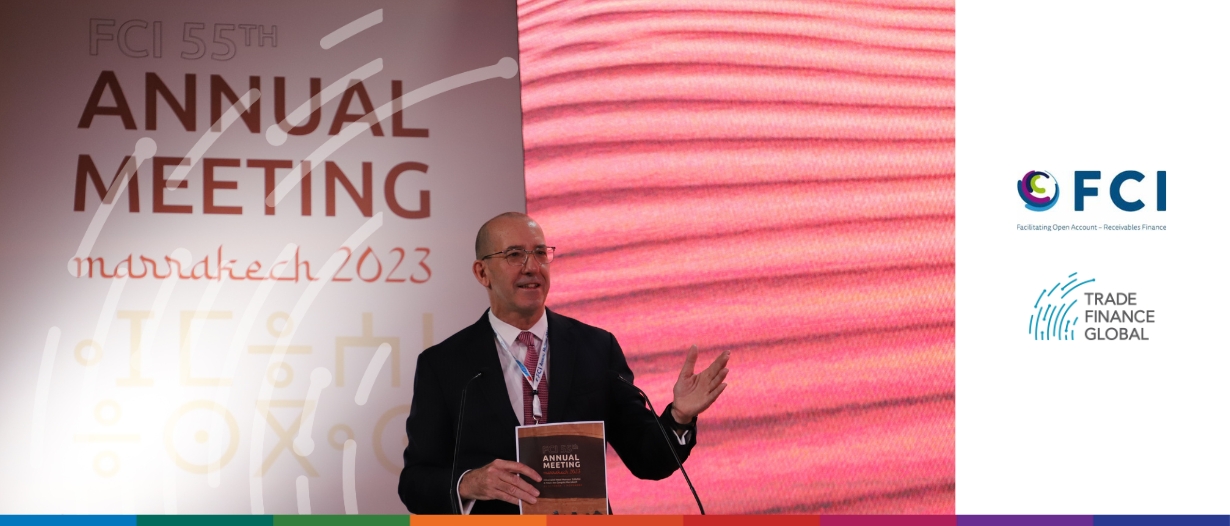Estimated reading time: 6 minutes
FCI, the global representative body for the factoring and receivables finance industry, has achieved a significant milestone by securing three major agreements during its annual meeting in Marrakesh.
These developments mark a substantial advancement for the global factoring industry, reinforcing FCI’s role as a key player in shaping the future of trade finance.
For years, factoring has transitioned from one element of invoice finance to another without a clear rulebook or operating manual for policymakers, legislatures, or central banks.
Much like a child experiencing teething pains during rapid growth, the factoring industry’s swift expansion to €3.6 trillion ($3.8 trillion) in 2022 reveals the urgent necessity for a solid legal and regulatory framework.
This foundational structure is important for ensuring the growth of receivables as a legitimate asset class, facilitating more accessible financing options for real economic growth.
At the FCI annual meeting held in Marrakesh on 30 October, the body announced three milestones that will accelerate the growth of factoring and receivables finance.

What is factoring?
Factoring relies on the legal concept of the assignment of third-party rights and their protection under the law.
In a factoring arrangement, upon a contract between the factoring company and its client, the former pays an agreed percentage of approved debts or receivables as soon as they are assigned.
With a factoring solution and based on a contract entered into by the factoring company and its client, the factoring company agrees to pay an agreed percentage of approved debts/ receivables as soon as the receivables are assigned or (in some jurisdictions) pledged to it by its client.
If credit protection is part of the factoring agreement, it is referred to as “non-recourse” factoring, while a factoring agreement where the credit risk on the debtor remains with the seller is called “with-recourse” factoring.
Over recent decades, receivables finance and particularly factoring have gained prominence as flexible tools for enhancing working capital, especially for small to medium-sized enterprises.
Factoring plays a vital role in sustaining the flow of goods and services in supply chains, notably in cross-border transactions.
Despite increasing calls for a unified regulatory framework, specific guidance remains absent.
Economies looking to establish a robust legal structure for factoring face a range of options, from comprehensive secured transactions law reforms to product-specific legislation; the choice is largely domestic.
In most developed markets, legal and regulatory frameworks have been established to allow for the assignment of receivables and the protection of third-party rights.
However, many emerging markets lack proper laws or regulatory schemes to govern factoring transactions.
The drafting of a contract for the assignment of receivables often relies on general provisions in contract law, resulting in frequent legal disputes over the creation, priority, and perfection of the assignment of receivables.
Without a solid legal framework for factoring, legislative gaps are gradually addressed through a mix of legislative interventions and judicial interpretations.
Hence, the pressing need for functional factoring legislation and regulations to support and advance factoring transactions has been recognized.
1. Enter UNIDROIT Model Law
UNIDROIT, the International Institute for the Unification of Private Law, is an independent intergovernmental organisation aimed at harmonising international private law across countries.
UNIDROIT was established in 1926 as the auxiliary organ of the League of Nations, an intergovernmental organisation aiming to harmonize international private law across countries through uniform rules, international conventions, the production of model laws, sets of principles, guides and guidelines.
The UNIDROIT, in 2019, embarked on creating the Factoring Model Law (FML) to provide an instrument for States wishing to introduce a new factoring law or update existing laws.
Initiated in 2018 by certain World Bank representatives, the FML aims especially at emerging markets considering introducing factoring.
FML provides a comprehensive guide for countries looking to develop or refine their domestic factoring laws, thereby facilitating cross-border transactions and promoting legal certainty.
Over the years, the FML has undergone revisions and updates to reflect the evolving needs and complexities of the factoring industry.
It has been instrumental in shaping factoring laws in various jurisdictions, serving as a reference point for both legislators and practitioners.
The launch of the FML was today released, led by Mr. Ignacio Tirado and Mr. William Brydie-Watson from the UNIDROIT.
2. Rulebook launched by IFC / World Bank – Factoring Regulatory Guide
At the meeting, the IFC/World Bank developed a Factoring Regulatory Guide to offer a coherent regulatory framework.
The guide serves as a comprehensive resource aimed at addressing the regulatory void in the rapidly growing factoring industry.
It is structured into six key sections that cover a broad spectrum of considerations.
- Section I covers the increasing importance of factoring, especially for SMEs, in enhancing working capital and facilitating supply chain finance,
- Section II covers the main regulatory trends that necessitate a unified framework for factoring,
- Section III offers a set of fundamental considerations for policymakers embarking on the establishment of a comprehensive legal and regulatory framework specific to factoring,
- Section IV covers how factoring activities can be integrated into various governance models,
- Section V covers the prudential regulatory framework that ensures the financial stability of institutions engaged in factoring,
- Section VI covers the conduct of business regulations applicable to factoring companies, including anti-money laundering measures and customer relations.
The guide culminates in a series of key policy options and recommendations, aimed at law reformers and jurisdictions.
It provides a roadmap for establishing a sound and proportionate regulatory framework for non-bank financial institutions involved in factoring.

3. Legal and regulatory study for factoring launched
Lastly, in 2020, FCI initiated an extensive project to explore the legal and regulatory mechanics for factoring worldwide.
This project expanded upon a unique comparative legal study by the European Federation for the Factoring and Commercial Finance industry (EUF), extending the coverage to include all countries where FCI has membership, thus encompassing data from 91 countries.
The concerted effort of global bodies and individuals, notably the FCI legal committee members and the UNIDROIT Working Group, has laid down the legal stepping stones for the factoring industry.
The 55th FCI annual meeting in Marrakech marks a significant stride towards a robust legal and regulatory framework, setting the stage for a new era in the global factoring industry.











































